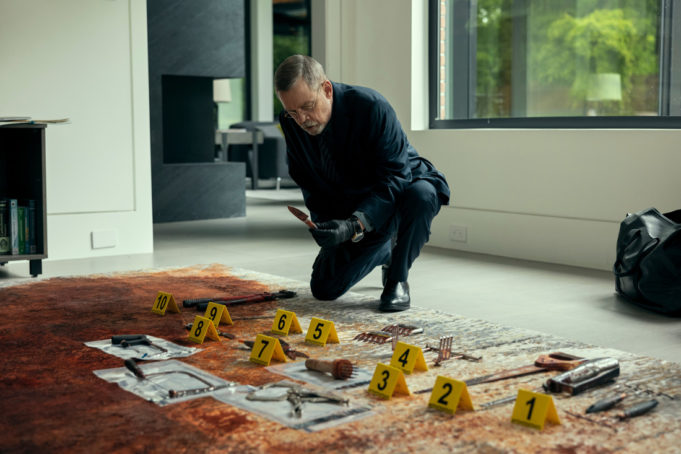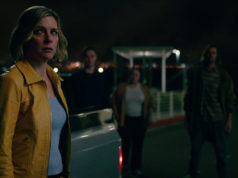Netflix just seems to be keen on Edgar Allan Poe, right? Last winter’s Wednesday had a Poe-themed episode, then Edgar Allan himself became a supporting character in the streamer’s murder mystery The Pale Blue Eye. Now, just in time for Halloween comes The Fall of the House of Usher, a contemporary-TV update of Poe’s horror stories. Someday I’d like to see Netflix take a similar interest in Oscar Wilde or Emily Dickinson. Hell, why not adapt the complete works of Shakespeare the way the BBC did in the 1980s? That seems like a worthy thing to do, and the streamer could do justice to it. In the meantime, this Poe series is the streaming equivalent of a page turner.
The eight-episode run starts with a framing device, as billionaire Roderick Usher (Bruce Greenwood) has seen all six of his children killed in separate accidents and suicides over a span of two weeks. The government is suing his business, Fortunato Pharmaceuticals, over its murderously addictive opioid pills that were marketed as safe enough for kids, yet he sets up in his old, abandoned childhood home one stereotypically dark and stormy night to confess all his crimes to assistant U.S. attorney C. Auguste Dupin (Carl Lumbly) in a private, recorded conversation. The middle six episodes are all based on a different Poe story, and all of them end with one of the degenerate spoiled brats meeting their death.
If Succession was a thinly veiled satire of the Murdoch family, this is a portrait of the Sacklers, with a dash of the Trumps thrown in. Indeed, one of the show’s funniest running gags is that the Ushers have Fox News in their pocket. Anticipating a sympathetic interview, an Usher daughter and crisis management specialist (Kate Siegel) says, “Hannity knows which side his dick is buttered on.” (Her corporate underlings are nauseated by that image, and likely so are you.) If your life currently has a hole that can only be filled by awful, rich family members trying to band together against the world while betraying one another and firing off comic zingers, here’s your show.
Me? I’m approaching this from a somewhat more literary standpoint. Besides the framing device, the thing threading through the different episodes is the appearance of a mysterious woman (Carla Gugino) who adopts numerous guises and accents. In a flashback to 1979, she’s a bartender who serves drinks to young Roderick and his twin sister Madeline (Zach Gilford and Willa Fitzgerald), then she turns up wholly unaged in the present day at a sex party thrown by Roderick’s youngest son Prospero “Perry” Usher (Sauriyan Sapkota).
Series creator Mike Flanagan — who previously helmed The Haunting of Hill House and The Haunting of Bly Manor for the streamer — can’t resist throwing in some Easter eggs for his own oeuvre as well as Poe’s, as one character scrolls by Flanagan’s Netflix movie Gerald’s Game, which starred Gugino. Here the creator’s trying to recast Poe’s stories for today. I’m glad that he avoids the obvious COVID parallels for “The Masque of the Red Death,” and of course the heart doctor character gets “The Tell-Tale Heart.” Episode 3, “Murder in the Rue Morgue,” takes place at a Fortunato animal testing facility that once had a logo for Roderick Usher Enterprises out front. The siblings called it “The RUE Morgue” because so many monkeys died there, and that crisis manager visits there not because she cares about animals but because she’s hoping to dig up dirt on the half-sister (T’Nia Miller) who runs the facility. This episode works better than the Poe story it’s based on and gives that crisis manager a satisfying death. (Turns out her strong-arm negotiating tactics don’t work so well on a roomful of angry chimps.)
Greenwood is miscast in this role — he’s a straight-up actor in a role that needed someone who could convey the character rotting from the inside. That’s made up for by some strong performances, starting with Mark Hamill as Arthur Gordon Pym, the family lawyer and fixer who puts on a pair of hip waders and walks unflinchingly through piles of decomposing corpses to retrieve incriminating evidence from a murder scene. (He does flinch a bit, though, when one of those corpses reaches out and grabs his ankle.) Rahul Kohli is weirdly likable and evil as Napoleon “Leo” Usher, the queer playboy video game mogul who’s always on the latest designer drug, but then he turns fearsome as he inflicts unspeakable violence on a black cat. A ponytailed Henry Thomas is great as the most detestable of the Usher kids, the weak-willed oldest son who takes terrible revenge on his crippled wife (Crystal Balint) after she attends that aforementioned sex party. (That last bit is a nod to “Berenice,” which I find to be Poe’s sickest and funniest horror story.)
Flanagan does let himself go on too long in the season finale, and the material with young Roderick drifting away from his wife Annabel Lee (Katie Parker) is dull. Even so, The Fall of the House of Usher manages to be something new and entertaining in the extensive field of movie and TV adaptations of Poe. Neither too highbrow nor too lowbrow, it brings the father of American horror to a new audience.
The Fall of the House of Usher
Starring Bruce Greenwood and Carla Gugino. Created by Mike Flanagan, based on Edgar Allan Poe’s stories. Rated TV-MA.











